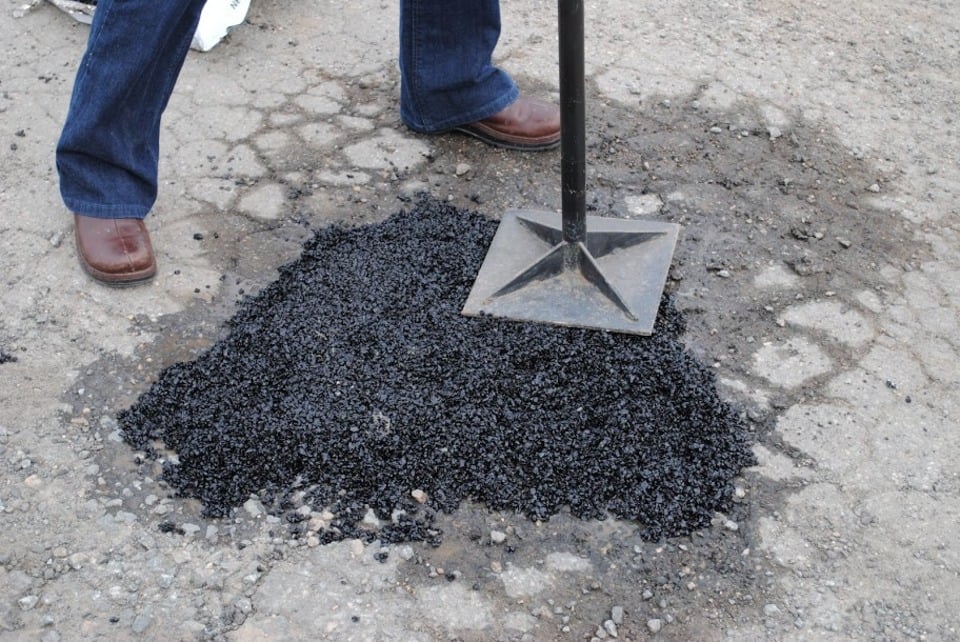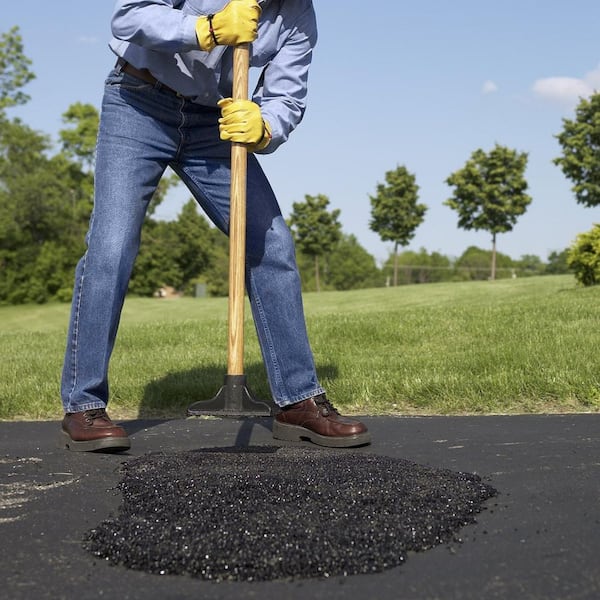Efficient Solutions for Asphalt Patch Repair: Cold Mix Asphalt Techniques
Efficient Solutions for Asphalt Patch Repair: Cold Mix Asphalt Techniques
Blog Article
Cold Mix Asphalt: Transforming the Way We Build Roads
As the infrastructure field proceeds to advance, the usage of cold mix asphalt offers an appealing shift in roadway building methodologies. The cutting-edge residential properties of cool mix asphalt are difficult traditional road-building techniques, paving the means for boosted effectiveness and resilience.
Advantages of Cold Mix Asphalt
What advantages does cold mix asphalt offer over typical hot mix asphalt in roadway construction projects? Cold mix asphalt supplies numerous benefits that make it a favored choice in specific circumstances. One key advantage is its ability to be made use of in all weather, unlike hot mix asphalt which requires certain temperature problems for laying and blending. This flexibility enables year-round construction, decreasing job timelines and costs linked with climate hold-ups.
Moreover, cool mix asphalt can be stockpiled for future usage, providing convenience and expense savings for maintenance tasks. Its simplicity of application, requiring no specific devices or home heating, makes it suitable for quick repair work and patching. Furthermore, chilly mix asphalt is extra eco friendly as it needs less energy for manufacturing and releases reduced degrees of greenhouse gases compared to hot mix asphalt. These benefits incorporated make cold mix asphalt a efficient and functional option for different road construction projects.

Environmental Advantages
Cold mix asphalt's ecological benefits contribute substantially to its charm as a sustainable selection for roadway building jobs. Among the vital environmental advantages of cool mix asphalt is its lower carbon footprint contrasted to hot mix asphalt. The production process of cool mix asphalt needs less power given that it can be made and applied at reduced temperatures, reducing greenhouse gas discharges. Additionally, cool mix asphalt is usually made utilizing recycled products such as recovered asphalt pavement (RAP) and recycled asphalt shingles (RAS), more lowering the need for new resources and drawing away waste from landfills.
Furthermore, using cold mix asphalt can bring about reduced energy usage throughout construction as a result of its capacity to be applied utilizing typical equipment without the demand for added home heating processes. This not only lowers gas consumption however additionally minimizes air pollution and boosts air top quality in the surrounding locations. By picking cold mix asphalt for road projects, building and construction firms can make a positive effect on the atmosphere while still making certain top quality and long lasting roadway surface areas.
Convenience in Climate Condition
In road building projects, the convenience of cool mix asphalt in numerous climate condition boosts its functionality and efficiency. Unlike hot mix asphalt, which requires high temperatures during mixing and installment, cool mix asphalt can be utilized in a variety of weather. Asphalt Repair. This flexibility makes it a beneficial alternative for road building in regions with severe temperature levels or uncertain weather condition patterns
Cold mix asphalt stays workable even in winter, allowing building and construction tasks to proceed throughout wintertime months when warm mix asphalt may not be a feasible option. Its ability to heal and set without the need for heats makes sure that roadway upkeep and repair work can be accomplished year-round, decreasing interruptions to traffic flow and lowering general project timelines.
In addition, cold mix asphalt's durability to dampness makes it appropriate for areas vulnerable to regular rainfall or high moisture. Its versatility and sturdiness enable it to hold up against growth and contraction caused by temperature level fluctuations, adding to longer-lasting roads that require less repair work over time. Generally, the flexibility of cold mix asphalt in various climate condition makes it a trustworthy choice for lasting and effective road building projects.

Cost-Effectiveness and Sustainability
Considering the environmental and financial influences of road building and construction products, just how does the cost-effectiveness and sustainability of cold mix asphalt compare to standard alternatives? Cold mix asphalt provides a compelling cost-effective and sustainable remedy for road building. In regards to cost-effectiveness, chilly mix asphalt generally needs reduced manufacturing temperatures, lowering power intake and manufacturing costs compared to hot mix asphalt. The capability to be stockpiled for long durations without setting additionally minimizes waste and enables easier repair and her comment is here maintenance, bring about total expense savings. Additionally, making use of chilly mix asphalt can lead to minimized transport costs due to its longer shelf life and the possibility of being produced on-site.
From a sustainability viewpoint, chilly mix asphalt provides several ecological advantages. Its lower production temperature levels lead to decreased greenhouse gas emissions and energy intake, aligning with efforts to minimize environment modification. The capability to recycle existing products right into chilly mix asphalt contributes to a round economic climate approach, lowering the need for virgin products and reducing total ecological impact. Generally, the cost-effectiveness and sustainability of cold mix asphalt make it an appealing alternative to conventional roadway building materials.
Effect On Roadway Resilience
Road durability substantially affects the lasting performance and maintenance requirements of asphalt pavements. Cold mix asphalt, with its special qualities, has a significant effect on roadway longevity. One key aspect is the capability of chilly mix asphalt to hold up against temperature fluctuations without compromising its structural integrity. This flexibility assists the sidewalk to resist rutting and fracturing created by changing weather problems, causing a longer service life for the roadway.
In addition, the chilly mix asphalt's improved resistance to moisture damages plays a crucial duty in preserving roadway toughness. Standard hot mix asphalt is more at risk to wetness infiltration, which can compromise the pavement framework in time. In contrast, cool mix asphalt's structure allows it to better resist water infiltration, decreasing the likelihood of splits and various other types of deterioration.
Conclusion
In verdict, chilly mix asphalt offers a wide variety of benefits for roadway construction, including ecological advantages, convenience in weather condition problems, cost-effectiveness, and enhanced roadway sturdiness. Its capability to be made use of year-round and its sustainable techniques make it a transformative option for developing roads that are both environmentally pleasant and durable. With its ingenious strategy and lasting outcomes, cool mix asphalt is changing the way we visit develop roadways for a more lasting future.
What advantages does chilly mix asphalt deal over traditional hot mix asphalt in roadway building and construction projects? Furthermore, cool mix asphalt is a lot more eco friendly as it requires less power for manufacturing and produces reduced levels of greenhouse gases contrasted to warm mix asphalt. Asphalt Repair. In addition, cold mix asphalt is typically made making use of recycled materials such as redeemed asphalt sidewalk (RAP) and recycled asphalt shingles (RAS), further decreasing the need for brand-new raw materials and drawing away waste from land fills
Unlike hot mix asphalt, which click here for more info requires high temperatures during mixing and installment, chilly mix asphalt can be used in a wide range of climate problems. In terms of cost-effectiveness, cold mix asphalt usually needs lower manufacturing temperature levels, decreasing energy consumption and production prices compared to hot mix asphalt.
Report this page